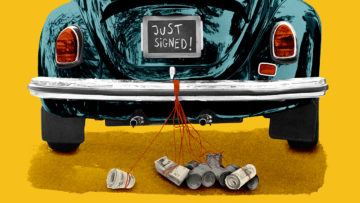Anna Baddeley in 1843 Magazine:
 You can hold hands if you want to.” We had arrived at the part in our ceremony where we had to parrot a legal declaration, and the registrar was clearly desperate to inject some romance into proceedings.
You can hold hands if you want to.” We had arrived at the part in our ceremony where we had to parrot a legal declaration, and the registrar was clearly desperate to inject some romance into proceedings.
In June, my partner and I were bound together in the eyes of the British state. We didn’t get married though – we got a civil partnership, a type of union invented for gay couples in 2004 that was recently opened up to straight couples after a long campaign to change the law. We had opted for a pared-down ceremony, with no guests apart from the two friends who were acting as our witnesses. The venue was Room 99, the cheapest space to get married at Islington Town Hall in north London. “I’d rather not hold his hand,” I said. “Mine are too sweaty.” The registrar apologised, worried she had offended me. I hadn’t meant to make her feel awkward, but I’m one of those people who instinctively makes a joke when put in an uncomfortable situation. And I was keen for the ceremony to be as unromantic as possible. We were doing this not for love, but for tax.
The social and economic rationale behind marriage used to be clear: sanctified, legal reproduction; a business deal between two families. Now that the feudal backdrop has disappeared, people get married for more waffly reasons. For most millennials, it’s merely an excuse for a party. When marriage is seen purely as a celebration of love, the legal and financial benefits are obscured. I suspect few of my friends got married because of the tax breaks, but in Britain marriage can reduce your income-tax bill, capital-gains tax and the inheritance tax your children have to pay (you also get automatic status as the next of kin in times of crisis and the right to claim some of your spouse’s money if you break up).
More here.
